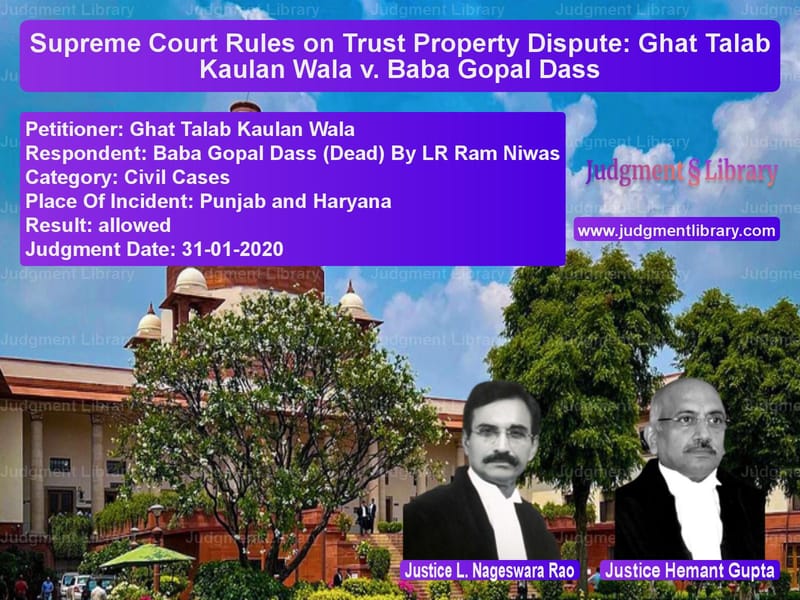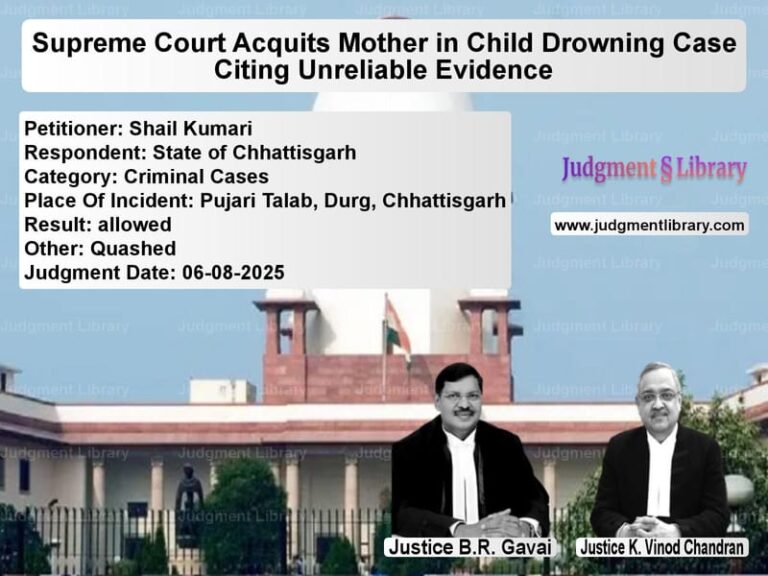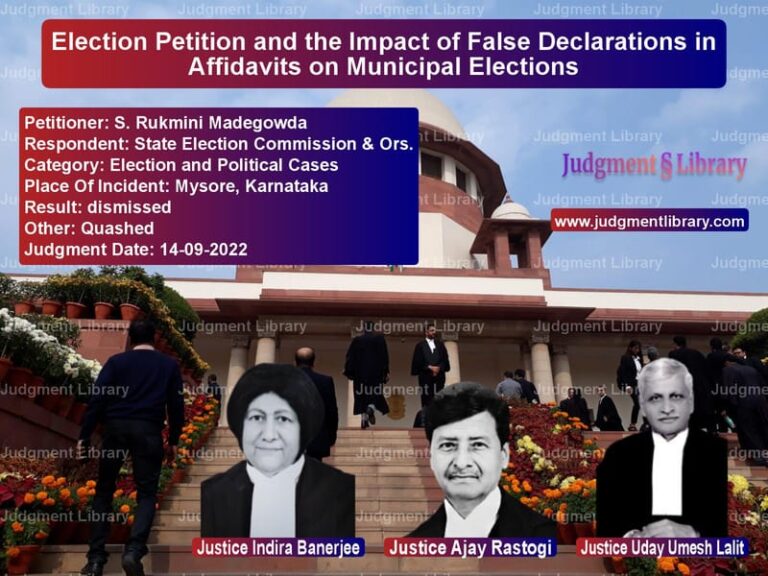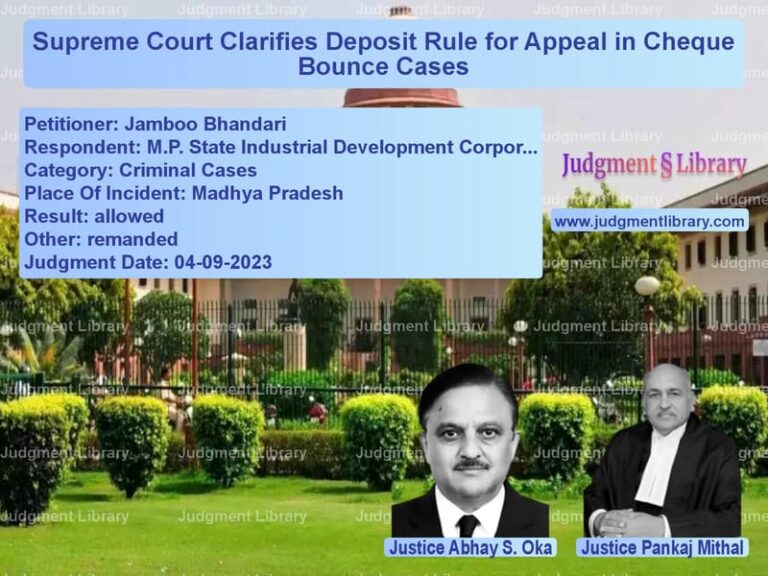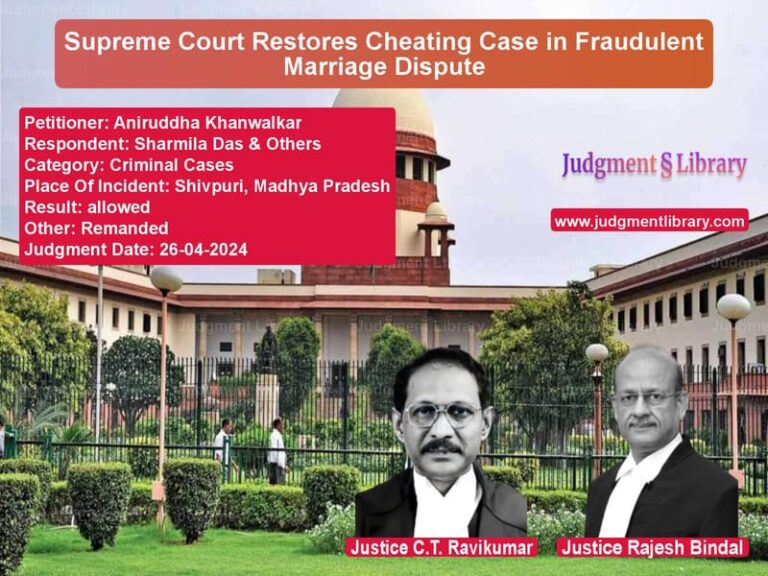Supreme Court Rules on Trust Property Dispute: Ghat Talab Kaulan Wala v. Baba Gopal Dass
The case of Ghat Talab Kaulan Wala v. Baba Gopal Dass (Dead) By LR Ram Niwas revolves around a dispute over the management of a temple property and whether a Trust could seek an injunction to remove a Sevadar who was allegedly mismanaging the property. The Supreme Court, in its judgment dated January 31, 2020, reinstated the decisions of the lower courts that had ruled in favor of the plaintiff Trust, overturning the Punjab and Haryana High Court’s contrary judgment.
This judgment is crucial in clarifying the legal principles surrounding Trust property management, the requirements of Section 92 of the Civil Procedure Code (CPC), and the role of Sevadars in religious institutions.
Background of the Case
The dispute pertains to the management of a religious Trust known as Ghat Talab Kaulan Wala, which sought a mandatory injunction directing the defendant, Baba Gopal Dass, to vacate the management of the temple and other Trust properties. The plaintiff Trust alleged that it was the rightful owner of the property and that the defendant was only a Sevadar who was failing in his duties.
The defendant, however, contended that the representatives of the plaintiff Trust were not legally appointed as Trustees and had no authority over the temple. He further argued that he was managing the temple for the welfare of the devotees and was not answerable to the plaintiff Trust.
The trial court ruled in favor of the plaintiff, holding that:
- The Trust was the rightful owner of the property.
- The defendant was a mere Sevadar and had no independent rights over the property.
- The defendant had failed to maintain proper accounts, justifying his removal.
The First Appellate Court upheld the trial court’s ruling, leading to an appeal by the defendant before the High Court.
High Court’s Decision
The Punjab and Haryana High Court overturned the lower courts’ decisions, holding that:
- The suit was not maintainable without obtaining leave under Section 92 of the CPC, which applies to cases involving public charitable trusts.
- The plaintiff Trust failed to establish that the temple property was dedicated to the public.
- There was insufficient evidence to prove that the defendant had mismanaged the temple property.
Based on these findings, the High Court ruled in favor of the defendant, effectively allowing him to continue managing the property.
Arguments by the Petitioner (Ghat Talab Kaulan Wala)
- The High Court erred in applying Section 92 of the CPC, which is meant for suits filed against a Trust, not by a Trust.
- The plaintiff Trust had clear ownership rights over the property and had the authority to seek the removal of a non-compliant Sevadar.
- The defendant had admitted in an earlier legal proceeding that he was a mere Sevadar and not the owner of the property.
- The High Court wrongly concluded that the property was not a public Trust despite clear evidence of its religious and charitable use.
Arguments by the Respondent (LR of Baba Gopal Dass – Ram Niwas)
- The plaintiff Trust failed to prove that it was legally constituted and had control over the temple property.
- The defendant was performing his religious duties in the temple and had not acted against the interests of the Trust.
- The plaintiff Trust had fraudulently entered its name in the revenue records without proper legal authority.
- Even if the defendant was a Sevadar, he could not be removed without proper legal proceedings.
Supreme Court’s Judgment
The Supreme Court ruled in favor of the plaintiff Trust and overturned the High Court’s decision, holding that:
- The Trust’s suit was not barred under Section 92 of the CPC since this provision applies only to suits against a Trust and not by a Trust seeking to remove an erring Sevadar.
- The defendant himself had admitted in a prior court statement that he was a Sevadar and that the Trust owned the property.
- Ram Niwas, the legal heir of the defendant, had no independent claim to the property and could not inherit religious services.
- The Trust had the right to seek the removal of a Sevadar who was not fulfilling his responsibilities.
The Court also rejected the respondent’s argument that the Trust funds would be misused, stating that the Trust was a registered society and had statutory obligations to manage its finances properly.
Legal Precedents Cited
- Bhagwan Dass v. Jairam Dass (1965) – Held that a Sevadar cannot claim ownership over temple property and is subject to the control of the Trust.
- State of Rajasthan v. Daya Lal (2011) – Established that public trusts must be managed by their appointed authorities.
- Ram Niwas v. Ghat Talab Kaulan Wala (2003) – Prior Supreme Court ruling on the same Trust, confirming its legal existence.
Impact of the Judgment
The Supreme Court’s decision has several important implications:
- Trusts can take legal action against erring Sevadars: This judgment clarifies that religious and charitable Trusts have the right to remove individuals who mismanage Trust property.
- Section 92 CPC does not apply to suits by Trusts: The ruling reinforces that this provision is intended for suits against Trusts, not those initiated by Trusts.
- Religious service cannot be inherited: The decision affirms that an individual serving as a Sevadar cannot pass on religious duties to a successor without proper authorization.
- Revenue records do not confer ownership: The case underscores that mere entry in revenue records does not establish ownership unless supported by legal documentation.
By ruling in favor of the Trust, the Supreme Court has reaffirmed the legal principles governing the management of religious institutions and the removal of individuals who fail in their duties.
Petitioner Name: Ghat Talab Kaulan Wala.Respondent Name: Baba Gopal Dass (Dead) By LR Ram Niwas.Judgment By: Justice L. Nageswara Rao, Justice Hemant Gupta.Place Of Incident: Punjab and Haryana.Judgment Date: 31-01-2020.
Don’t miss out on the full details! Download the complete judgment in PDF format below and gain valuable insights instantly!
Download Judgment: Ghat Talab Kaulan Wa vs Baba Gopal Dass (Dea Supreme Court of India Judgment Dated 31-01-2020.pdf
Direct Downlaod Judgment: Direct downlaod this Judgment
See all petitions in Property Disputes
See all petitions in Succession and Wills
See all petitions in Contract Disputes
See all petitions in Judgment by L. Nageswara Rao
See all petitions in Judgment by Hemant Gupta
See all petitions in allowed
See all petitions in supreme court of India judgments January 2020
See all petitions in 2020 judgments
See all posts in Civil Cases Category
See all allowed petitions in Civil Cases Category
See all Dismissed petitions in Civil Cases Category
See all partially allowed petitions in Civil Cases Category

